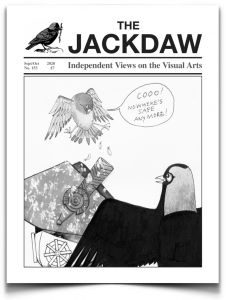David Lee
March/April 2020
The Arts Council is offering a contract worth £42,000 for an expert to draw up guidelines on how museums must deal with what it calls ‘decolonisation’. Naturally, conclusions reached will be expected to reinforce the Council’s existing prejudices: it supports repatriation where possible, and exhibition contexts, especially captions, must report the serial crimes of colonialism with an emphasis on any potentially dubious means by which objects may have been acquired – the concerned Liberal mentality of metropolitan State Art, you understand, despises our colonial and imperial history. Once the Commandments of the resulting document are chiselled in stone, its recommendations will have to be followed. As with everything relating to the Arts Council, given its crucial position as sole Keeper of the Wallet, blackmail will be used to encourage compliance: museums failing to follow orders will be told to eat cake.
Having first won legitimacy from an electorate, it is Governments which traditionally make laws not unelected quangos. Here is yet another example of how the ACE behaves increasingly like a Soviet Ministry of Culture, issuing diktats which must be followed at pain, in this instance, of financial penalty. Why should the Arts Council be poking its nose into formulating a code of behaviour for the ‘decolonisation’ of museums? Such matters are none of its business and were never intended to be.
For some reason fashionable obsessions with the likes of colonialism, diversity and gender remain dominant in the visual arts. They precede every other consideration. Emboldened by successive Governments’ indifference to their flagrant political activities, the Contemporary Art establishment gets further and further above itself; indeed the Art’s Council gives the impression of having the Government on the run.
When the Arts Council was founded in 1946 its purpose was to serve artists, not the other way round (see Moping Owl). Assistance included occasional purchases, and also organising touring exhibitions to parts of the country which, until that time, were uncharted territory for the work of artists living or historical. This was a necessary reaction to circumstances. Like everyone else, artists had endured a thin time during the ’30s Depression. Even well-known, accomplished painters frequently complained of selling no work, the generosity of private patronage alone in many cases preventing genuine hardship. Successes achieved by charitable bodies circulating shows to remote outposts, especially during the war years, encouraged positive ideas for the creation of a permanent post-war, state-run body. This developing plan wasn’t universally supported. Among other intellectuals, both Eliot and Orwell forecast that before long such an organisation would begin telling artists what to do. Their predictions gradually came to pass and have led to the current dictatorship of a narrow taste supported only by a few powerful individuals. Years ago this paper warned that the outcome of letting the Arts Council administer not just Treasury cash but also to distribute Lottery profits would give the Council a stranglehold it would use to make increasingly invasive demands with menaces attached. It’s been applying these contingencies now for thirty years, making grants conditional on meeting diversity, carbon recapture and gender/sexual/racial quotas.
Encouraged by the apparent unanimity of view among gallery and museum staff (these workers are hand-picked for willing compliance), the Council is now so cockily confident of its invulnerability they openly admit the terms of their blackmail. The special advantage the Council has now is to have a notable figurehead with form in precisely these areas. We wondered how long it would be before Comrade Serota showed his colours by forming the unelected Arts Secretariat of his dreams with himself as Big Brother. He took over the Council in 2016 after leaving the Tate in the hands of dreary dependables apparently delighted with the monoculture he’d established. He is now dictating policies at the Council intended to advance further the damaging progress already made towards a programme of social and political engineering which has nothing whatsoever to do with art.
It is long overdue that the actual Department of Culture informed itself properly about these developments. Both it and the Charities Commission should be investigating the Arts Council’s and its clients’ incursions into political matters which are nothing to do with either their charters or the legal requirements and responsibilities of a charity.


